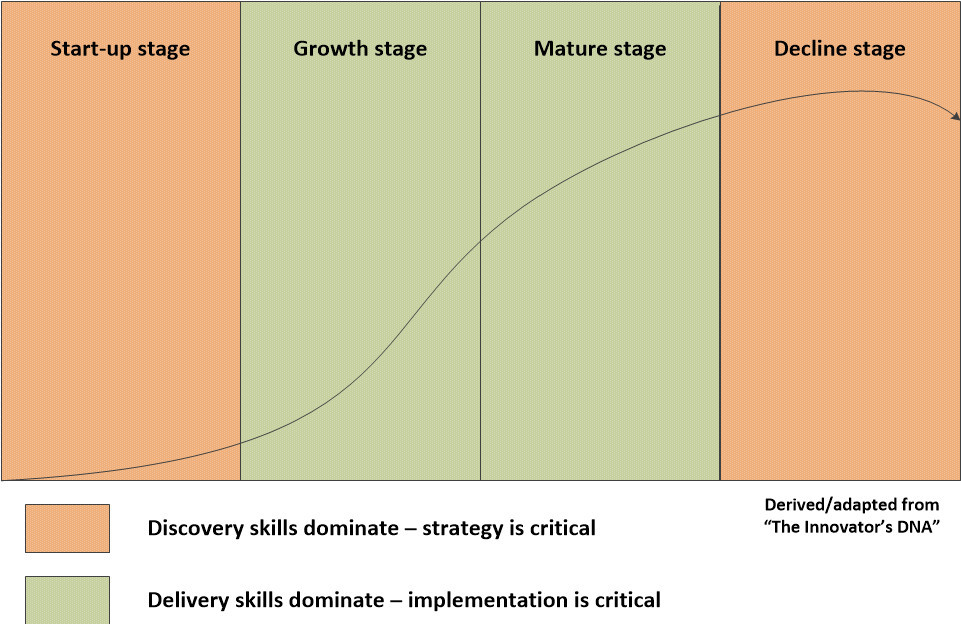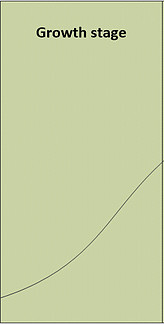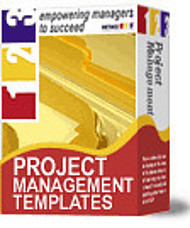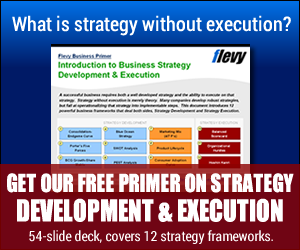I have previously talked about the product life cycle, and how it is helpful in project planning to have perspective on what your project is supporting in terms of the product life cycle stages. That applies to businesses that produce and sell products.
There is another model, similar in structure, about the business development life cycle. It applies not just to product oriented businesses, but really virtually any business. It explores the four business development life cycle stages that a business passes through as it develops.
Like the product life cycle model, identifying the stage of the business your project is supporting effects how you approach the project in many ways. It gives you, the project manager, a helpful perspective in prioritizing, making decisions, and reporting on key metrics that are in sync with strategy.
This article explores the kind of management and executive skills that are most critical for the business at each business stage. They are different! This article highlights the differences between strategy and implementation skills required in each stage. , both of which are important all the time – but one or the other is critical depending upon the stage of the business life cycle.
The Four Business Development Life Cycle Stages
The graphic below illustrates the life cycles stages for a business. A business passes through the Start-up stage, progresses to the Growth stage, reaches a Mature stage, and finally enters the final Decline stage.

Note that the colors on the chart indicate the type of skills that dominate, and what skills are critical to success in each stage. The chart shows that Discovery skills dominate, and Strategy is critical, in the Start-up and Decline stages. It also shows that Delivery skills dominate, and Implementation is critical, in the Growth and Mature stages.
Let’s explore in more detail each of these stages, and the implications for a project manager.
—————————————-
I recommend these PM templates (paid link):
—————————————-
Discovering During the Start-up Stage

The Start-up stage entails driving the business from nothing to something – through a slow but slightly accelerating growth path.
One of the keys in this stage is to ‘gain traction’. That means developing some meaningful relationships with some early customers, tweaking a product or service through optimization for those customers, and developing a model for the business that is profitable and sustainable.
What dominates during the Start-up stage?
- Developing some meaningful relationships with some early customers – even finding out who they are and what they want – is more about Discovery and Strategy and less about implementation.
- Tweaking a product or service through optimization for those customers again is more about Discovery and Strategy. The focus is on optimizing the product or service, and not yet on implementing on a wider scale.
- Developing a model for the business that is profitable and sustainable is also about Discovery and Strategy. It is about learning and defining the model with the intention to later be scaled through strong implementation.
What does this mean for a project manager when managing a project in the Start-up stage?
A great deal of flexibility is required! Focus will be more on Discovery – so some projects will be all about ‘learning’ and not so much about performance.
Budgets will be tight and so there need to be explicit goals, mostly near term, and preservation of capital will be key. Mostly agile approaches with short-term wins will work best.
Implementing Through the Growth Stage
 The Growth stage entails driving the business from something that has gained traction into a growth machine.
The Growth stage entails driving the business from something that has gained traction into a growth machine.
One of the keys in this stage is to ‘accelerate growth’ – as indicated by the accelerating curve as shown in the figure. That means developing processes that can support the growth throughout the business, building the base of resources that will eventually sustain a higher level of business, and scaling the business in ways that produce even more value.
What skills dominate during the Growth stage?
- Clearly Delivery skills dominate in the Growth stage. With a well-defined product or service and business model, and some traction in the market, the Growth stage is mostly about Implementation.
- The Growth phase drives the business from a dream with some traction into something of organizational and market substance.
The following occurs to me when I think about project management during the Growth phase:
- Developing processes throughout the business that can support the growth is much more about Delivery and Implementation and less about Discovery and Strategy.
- Building the base of resources that will sustain a higher level of business is primarily about Delivery and Implementation.
- Scaling the business in ways that produce more value is less about Discover and Strategy – and more about Delivery and Implementation.
What does this mean for a project manager managing a project in the business’s Growth stage?
There is a great deal of project work in the Growth phase of a business – with immense challenges. Strong execution is critical. Compared to the Start-up stage, it is more about making it happen – on time, within budget, and to the prescribed performance standards. Projects in this stage must be managed by a balance – probably a hybrid approach – of agile and waterfall, with emphasis on time, budget, and performance.
Continuing to Deliver Through the Mature Stage
 The Mature stage entails driving the business from something that has gained traction and grown to managing it well as a proven and more stable organization.
The Mature stage entails driving the business from something that has gained traction and grown to managing it well as a proven and more stable organization.
It is important in the Mature phase to manage a deceleration of growth – as indicated by the curve at right that shows growth but at a declining rate. That means tuning processes throughout the business that can support slower growth, carefully managing resources to maximize value added and profitability, and achieving competitive advantages, including branding.
What skills dominate during the Mature stage?
- Delivery skills again dominate in the Mature phase as the company needs to carefully manage its way through a relatively stable period of growth.
- Tuning processes to support slower growth takes great Delivery and Implementation, and not so much Discovery and Strategy.
- Managing resources to maximize value added and profitability again requires much more on the Implementation side that the Discovery side.
Achieving competitive advantages, including branding, sounds strategic, but in the Mature phase it is mostly Implementation. The strategy was already set mostly in the Start-up stage – it’s too late if not already set once your reach the Mature stage – so at this point it’s all about Implementation. If the company has achieved branding advantages, it needs to implement the pricing and marketing strategies that allow it to maximize the benefit for the brand effect.
What does this mean for a project manager when managing projects in the Mature stage?
Project work in the Mature phase of a business turns toward supporting stability. Strong execution is important because cost control is a focus. Fewer resources are being deployed to achieve growth, so good tactical thinking and Delivery are most important. Projects in the Mature stage again will typically employ a hybrid approach of agile and waterfall, again emphasizing schedule, budget, and performance.
Discovering Again Through the Decline Stage
 The Decline stage entails pivoting the business from something that has gained traction, grown, and matured to something that is declining but may be able to transform for the future.
The Decline stage entails pivoting the business from something that has gained traction, grown, and matured to something that is declining but may be able to transform for the future.
There are two challenges:
- Managing fiscal health during a decline in revenues, and
- Looking to the future through potential transformation and redeployment of resources.
That means downsizing where necessary, and leveraging existing advantages in potential future business areas.
What skill sets dominate during the Decline stage?
- The Decline stage represents a major change, including the survival of the business. It requires more Discovery and Strategy skills in lieu of Delivery and Implementation.
- Managing fiscal health during this period of decline in revenues will require some creativity as well as strong Implementation. The way to do this may not be entirely clear, and the business will need to feel its way through, requiring more Discovery and Strategy than the prior two stages.
- Looking to transform the business for an uncertain future will require some major Strategy skills. What current advantages might the business leverage? What is not known that needs to be Discovered to move ahead? These are the types of struggles the business faces in the Decline stage.
What does this mean for a project manager when operating in the Decline stage?
Project work in the Decline phase of a business turns away from supporting stability and to managing decline – or downsizing. However, if the business is also transforming, it can be an exciting time of downsizing one entity and up sizing another – transformational repurposing of resources.
Strong execution is always important and is part of the mix, but it will not be the driver in the same way as the last two stages. Like the Start-up stage, some projects in the Decline stage may even be for the purpose of learning to inform the transformation.
Putting the Business Development Life Cycle Stages into Perspective
This post has explored the life cycle of a business, the four business development life cycle stages, and the implications for managing projects in each of the stages.
One of the key considerations as a business passes through these life cycle stages is that the executive and management skills needed change, depending upon the stage. Delivery and Implementation skills are always important, but Discovery and Strategy skills dominate in the Start-up and Decline stages. In the Growth and Mature stages, Discovery and Strategy skills are far less critical than Delivery and Implementation skills.
As a project manager – whether managing projects, programs, and portfolios – you can be informed with an awareness of the organization’s business stage. This can help to shape your decisions related to processes, business models, and products on your projects and programs.
And it all helps you to be a more effective strategic project manager.
—————————————-
I recommend these strategy resources (paid link):
—————————————-

